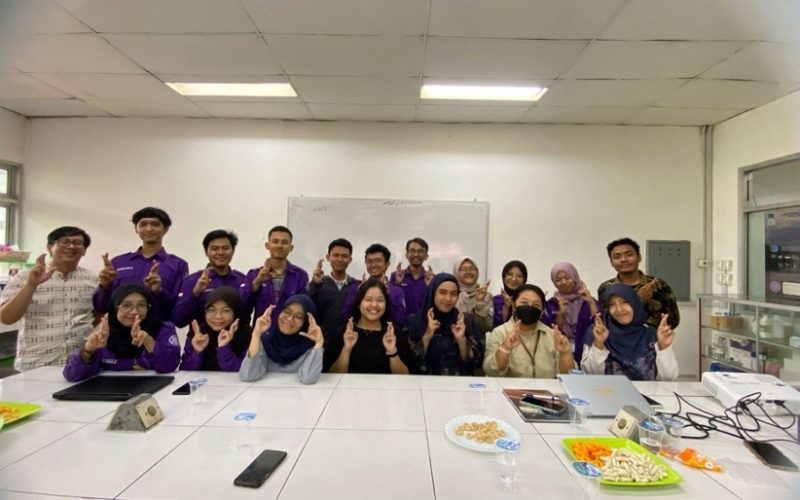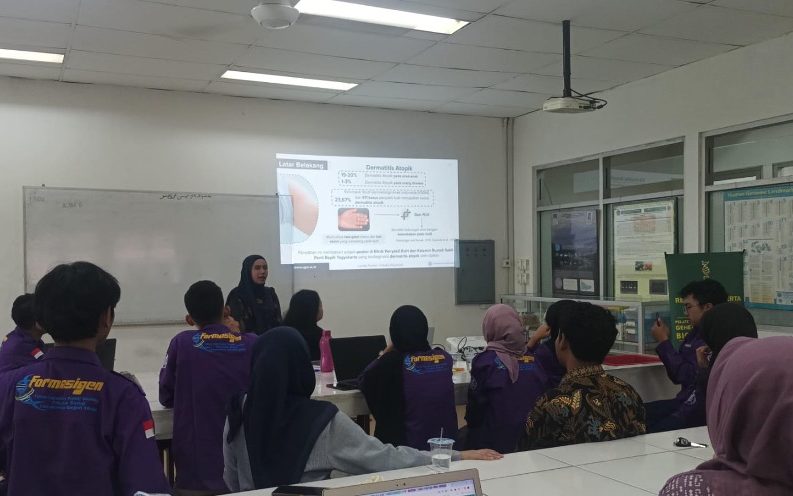On Friday, June 14, 2024 at 13.00-14.30 WIB, Gentalk 4 was held. The event was held at the Genetics and Breeding Laboratory, Faculty of Biology UGM. The activity targeted towards Formasigen students and public. This activity was attended by Mrs. Ganies Riza Aristya, S.Si., M.Sc., Ph.D. as the Formasigen supervisor lecturer and Dr. Niken Satuti Nur Handayani, M.Sc. as lecturers from Genetics and Breeding Laboratory. Gentalk activities are a forum for active discussion and sharing between alumni or seniors related to the topic of the undergraduate thesis being worked on with Formasigen students and the public. The speaker in Gentalks 4 are Luisa Ramyahastri Paramatatya and Tazkia Mahsya Syavira, students of the Faculty of Biology UGM class of 2020 and under the guidance of Dr. Niken Satuti Nur Handayani, M.Sc. as their undergraduate thesis supervisor.
The event commenced with an introduction by the MC, Thoriq Abdul Halim, who serves as the Head of the Scientific Division of the GenomCity 2024 Cabinet. This was followed by remarks from Mrs. Ganies Riza Aristya, S.Si., M.Sc., Ph.D., and Dr. Niken Satuti Nur Handayani, M.Sc. In their remarks, Mrs. Ganies and Mrs. Niken expressed their hope that Gentalk can become a forum for sharing research results with active participation from various parties, beyond just Formasigen. The activity continued with a presentation by the first speaker, Luisa Ramyahastri Paramatatya, on her undergraduate thesis research topic entitled “Detection of rs9939609 and rs1421085 Variants of the Fat Mass and Obesity (FTO) Gene in Patients with Obesity.” Luisa explained that the FTO gene is associated with obesity and affects the process of energy metabolism. This study aims to determine the presence or absence of rs9939609 and rs1421085 variants of the FTO gene in obese patients at Panti Rapih Yogyakarta and calculate the prevalence of these two variants. It is hoped that this research will provide an understanding of the potential of these variants in predicting the risk of obesity and the genotypic relationships that arise in obese patients at Panti Rapih Yogyakarta. The activity continued with a presentation by the second speaker, Tazkia Mahsya Syavira, on her undergraduate thesis research topic entitled “Detection of Filaggrin Gene (FLG) Polymorphism Variants Associated with Atopic Dermatitis.” Tazkia explained that the FLG gene affects the formation of the skin’s natural moisturizing factor. This study aims to detect the presence of the FLG gene polymorphism variant 3321delA and the percentage of individuals with this variant among patients with atopic dermatitis at Panti Rapih Hospital Yogyakarta. The study is expected to provide information on FLG gene SNP variants in patients with atopic dermatitis at Panti Rapih Yogyakarta Hospital and its potential use as a biomarker for detecting atopic dermatitis. The activity concluded with a question and answer session with the audience, followed by a documentation session. [Author: Formasigen]



